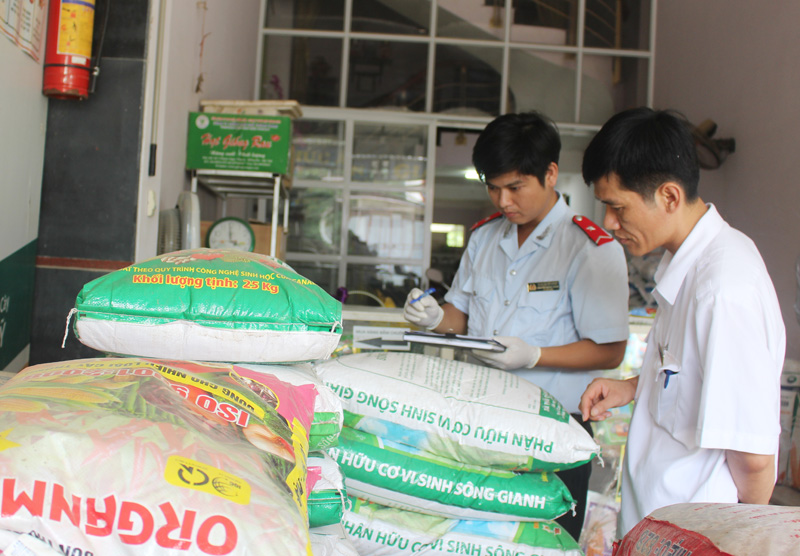
(HBO) – Cao Phong district has many agricultural products popular among consumers nationwide like sugar cane and orange. Ensuring safety in agriculture is one of the district’s moves to improve the value of these products and build a value chain for them and an important content of the local project to effectively and sustainably restructure the agriculture.

Inspectors are examining a shop of
agricultural inputs in Cao Phong township, Cao Phong district.
The district’s division of agriculture and rural development has
partnered with the People’s Committee of Tay Phong commune to inspect 12
butcher’s at Bang wet market and provide them with guidelines on how to comply
with food safety rules.
Earlier this year, cadmium, a harmful food additive, was found by
the division in the samples of cabbage and bok choy taken from a vegetable shop
at the temporary wet market in Zone 5A, Cao Phong township.
Inspectors alsotaken samples of leaf mustard, cucumber, Malabar
spinach, water morning glory and others from four vegetable shops at the market
to test for pesticide residue and examined origin of products. They discovered
that pesticides remaining on the leaf mustard and water morning glory were
higher than the maximum allowable levels.
The division has educated the vegetable shop’s owners on food
safety and instructed them how to select safe suppliers of vegetables. Those
with violations were required to destroy unsafe products and make records of
their products’ information, including origin, suppliers, time of purchases.
They must also sign contracts with the suppliers.
At the temporary market in Zone 5A, 17 butcher’s have signed
commitments to follow regulations on food safety./.
More than just an information technology teacher, Bui Van Nien is an inspiring figure who has nurtured the scientific curiosity and creative spirit of students in Vietnam’s ethnic minority communities.
Da Bac is the most disadvantaged mountainous district in Hoa Binh province, with ethnic minorities accounting for about 90% of its population. Over the past years, the district has mobilised resources to implement ethnic policies to improve the quality of life of local people.
In recent years, Hoa Binh province has consistently prioritised the protection, care, and education of children, particularly those from ethnic minorities and disadvantaged backgrounds, by creating a safe, healthy, and nurturing environment for their all-round development.
The Steering Committee for Tobacco Harm Prevention and Control of Hoa Binh province, in coordination with the Tobacco Harm Prevention and Control Fund, held a ceremony on May 28 in response to the World No Tobacco Day (May 31) and the National No Tobacco Week (from May 25 to 31). The event was chaired by Nguyen Van Toan, Standing Vice Chairman of the provincial People’s Committee and head of the Steering Committee.
Since 2021, the Center for Industrial Promotion and Industrial Development Consulting (CIIDC) under the Department of Industry and Trade has been implementing a school lighting model as part of the plan for using energy efficiently and economically in Hoa Binh Province in the pẻiod of 2021 - 2025. This model not only aims to improve the learning conditions and enhance the education quality, but it also promotes the message of energy saving, energy security, environmental protection and contributes to the goals of socio-economic development.
In the 2024 - 2025 school year, the entire Hoa Binh provincial education sector includes 520 educational institutions and schools. Among them are 13 ethnic boarding schools with 153 classes and 4,487 students. Four of these schools have met national standards, reaching 30.7 percent.



